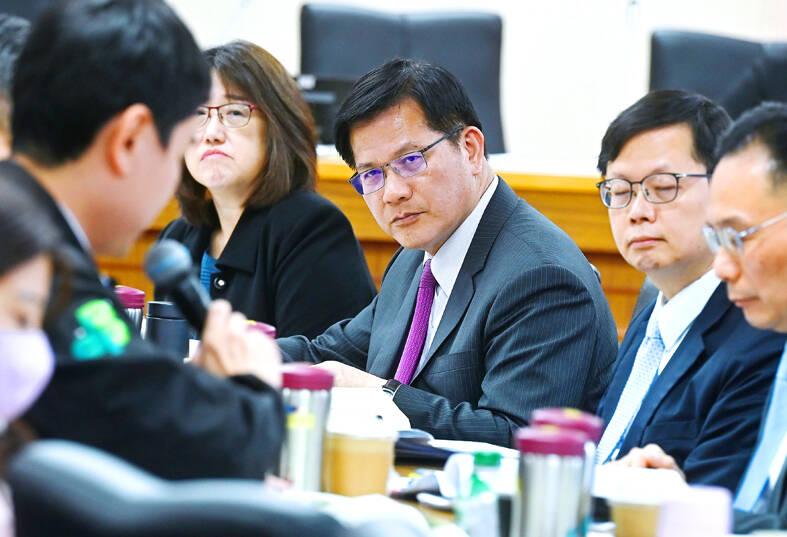In his first interview with international media since taking the post of Minister of Foreign Affairs, Lin Chia-lung (林佳龍) called Taiwan a tipping point in the global balance of power.
Lin made the comments to Nikkei Asia, emphasizing that Taiwan is not just a “chess piece” caught in the middle, but also an actor in its own right that can help countries manage China’s authoritarian rise.
Calling China’s rise a challenge to the international order, Lin told the paper that Taiwan would work with like-minded, democratic countries to form a democratic, global supply chain as a counter to China’s Belt and Road and Digital Silk Road initiatives.

Photo: Wang Yi-sung, Taipei Times
The government has identified eight industries in which it can cooperate with friendly countries to establish supply chains without the participation of Chinese companies, including semiconductors, artificial intelligence and cybersecurity, he said.
Taiwan would also increase military spending in line with US president-elect Donald Trump’s goals of friendly countries taking more responsibility for their own defense, he added.
This could potentially mean further integration of the US and Taiwanese defense industries, Lin added, mentioning his hope that the US government would allow for more advanced weapon transfers in future arms agreements.
Taiwan’s defense spending is at 2.5 percent of GDP, more than South Korea, Japan and several NATO countries, Lin said.
Taiwan’s position on the first island chain means that Chinese aggression against the nation has ramifications for the international community, Lin said.
As long as China’s military power continues to increase, Taiwan must also increase its defense budget, he added.
China has already engaged in “gray zone” tactics, such as spreading disinformation and incursions into Taiwan’s airspace, as a way of increasing pressure on the country, Lin said.
Just last month, the Presidential Office invited 19 ministries and 16 local bureaus to participate in a tabletop exercise simulating a military escalation with China, he said.
China is currently blocking Taiwan’s entry into the Comprehensive and Progressive Agreement for Trans-Pacific Partnership, Lin said, adding that Japan should consider signing a separate trade deal with Taiwan.

The Ministry of Education (MOE) is to launch a new program to encourage international students to stay in Taiwan and explore job opportunities here after graduation, Deputy Minister of Education Yeh Ping-cheng (葉丙成) said on Friday. The government would provide full scholarships for international students to further their studies for two years in Taiwan, so those who want to pursue a master’s degree can consider applying for the program, he said. The fields included are science, technology, engineering, mathematics, semiconductors and finance, Yeh added. The program, called “Intense 2+2,” would also assist international students who completed the two years of further studies in

Former president Tsai Ing-wen (蔡英文) departed for Europe on Friday night, with planned stops in Lithuania and Denmark. Tsai arrived at Taiwan Taoyuan International Airport on Friday night, but did not speak to reporters before departing. Tsai wrote on social media later that the purpose of the trip was to reaffirm the commitment of Taiwanese to working with democratic allies to promote regional security and stability, upholding freedom and democracy, and defending their homeland. She also expressed hope that through joint efforts, Taiwan and Europe would continue to be partners building up economic resilience on the global stage. The former president was to first

Taiwan will now have four additional national holidays after the Legislative Yuan passed an amendment today, which also made Labor Day a national holiday for all sectors. The Chinese Nationalist Party (KMT) and Taiwan People’s Party (TPP) used their majority in the Legislative Yuan to pass the amendment to the Act on Implementing Memorial Days and State Holidays (紀念日及節日實施辦法), which the parties jointly proposed, in its third and final reading today. The legislature passed the bill to amend the act, which is currently enforced administratively, raising it to the legal level. The new legislation recognizes Confucius’ birthday on Sept. 28, the

MORE NEEDED: Recall drives against legislators in Miaoli’s two districts and Hsinchu’s second district were still a few thousand signatures short of the second-stage threshold Campaigners aiming to recall Chinese Nationalist Party (KMT) legislators yesterday said they expect success in 30 out of 35 districts where drives have passed the second-stage threshold, which would mark a record number of recall votes held at once. Hsinchu County recall campaigners yesterday announced that they reached the second-stage threshold in the recall effort against Legislator Lin Szu-ming (林思銘). A total of 26,414 signatures have been gathered over the past two months, surpassing the 10 percent threshold of 23,287 in Hsinchu County’s second electoral district, chief campaigner Hsieh Ting-ting (謝婷婷) said. “Our target is to gather an additional 1,500 signatures to reach